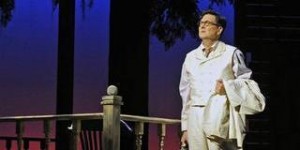In today’s Wall Street Journal I report from Florida on two very impressive Orlando Shakespeare Theatre productions, To Kill a Mockingbird and Henry V. Here’s an excerpt.
* * *
Now that Harper Lee is back in the news, it’s likely that Christopher Sergel’s workmanlike 1990 stage version of “To Kill a Mockingbird,” which was already a staple of regional theaters throughout America, will be mounted even more frequently than it was in the past quarter-century. Not being a fan of theatrical adaptations of popular novels, I’d hitherto steered clear of it, but the controversy over the discovery of “Go Set a Watchman,” the first draft of “Mockingbird,” made me curious. How would so familiar a book, especially one that was made into an equally well-known film, go over on stage? And when I heard that it was being performed by Florida’s Orlando Shakespeare Theatre, I was even more curious to know how “Mockingbird” would be received in a state where 331 lynchings took place between 1877 and 1950. So I went to see for myself—and was mightily impressed….
 The secret ingredient in Orlando Shakespeare’s recipe is the staging of Thomas Ouellette, which is exceptional in every way. For openers, Mr. Ouellette has made sure that his cast does nothing to remind you of the now-iconic performances seen in Robert Mulligan’s 1962 film version. Instead of “doing” Gregory Peck, Warren Kelley turns Atticus Finch into a geeky, almost comically earnest small-town lawyer who somehow finds within himself the power to rise to the occasion of defending a black man falsely accused of rape—and it works. Kennedy Joy Foristall’s strident, bratty Scout is similarly idiosyncratic, and the other characters are no less sharply drawn. The dramatic tension in each scene is unobtrusively screwed up to the highest possible pitch….
The secret ingredient in Orlando Shakespeare’s recipe is the staging of Thomas Ouellette, which is exceptional in every way. For openers, Mr. Ouellette has made sure that his cast does nothing to remind you of the now-iconic performances seen in Robert Mulligan’s 1962 film version. Instead of “doing” Gregory Peck, Warren Kelley turns Atticus Finch into a geeky, almost comically earnest small-town lawyer who somehow finds within himself the power to rise to the occasion of defending a black man falsely accused of rape—and it works. Kennedy Joy Foristall’s strident, bratty Scout is similarly idiosyncratic, and the other characters are no less sharply drawn. The dramatic tension in each scene is unobtrusively screwed up to the highest possible pitch….
Orlando Shakespeare Theatre is a puzzlement, a first-class drama company whose stature is too often obscured by unadventurous programming. It’s only because I already knew how good Orlando Shakespeare is that I went out of my way to see its production of “To Kill a Mockingbird,” and Jim Helsinger’s “Henry V” poses a like problem: why bother with yet another revival of a classic that gets done so very often? The answer is that this is an extraordinarily fine small-scale production of a supremely great history play, performed on an open stage in a 118-seat theater by six men and two women, all of them outstanding. Everyone in the cast plays double or triple roles, even John P. Keller, who is both grippingly incisive as young Henry and preposterously foppish as the Dauphin. Mr. Helsinger’s staging is propelled by a strong comic energy that is never allowed to undercut the high seriousness of the proceedings….
* * *
To read my complete review of To Kill a Mockingbird, go here.
To read my complete review of Henry V, go here.

 The top story in the fine-art business is the “rediscovery” (if that’s the word—they were never lost) of a pair of privately owned bronze sculptures on display at England’s Fitzwilliam Museum. A team of art historians now thinks they were handmade by Michelangelo, the “Last Judgment” man. Should this new attribution stand up to scholarly scrutiny, they will be, so far as is known, the only surviving Michelangelo bronzes in the world.
The top story in the fine-art business is the “rediscovery” (if that’s the word—they were never lost) of a pair of privately owned bronze sculptures on display at England’s Fitzwilliam Museum. A team of art historians now thinks they were handmade by Michelangelo, the “Last Judgment” man. Should this new attribution stand up to scholarly scrutiny, they will be, so far as is known, the only surviving Michelangelo bronzes in the world.